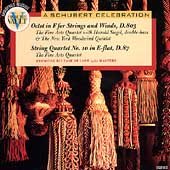| All Artists: Franz [Vienna] Schubert, Fine Arts Quartet, Members of the New York Woodwind Quintet Title: Schubert: Octet In F/String Quartet No.10 Members Wishing: 0 Total Copies: 0 Label: Boston Skyline Release Date: 3/18/1997 Genre: Classical Styles: Chamber Music, Historical Periods, Modern, 20th, & 21st Century, Symphonies Number of Discs: 1 SwapaCD Credits: 1 UPC: 730357014329 |
Search - Franz [Vienna] Schubert, Fine Arts Quartet, Members of the New York Woodwind Quintet :: Schubert: Octet In F/String Quartet No.10
 | Franz [Vienna] Schubert, Fine Arts Quartet, Members of the New York Woodwind Quintet Schubert: Octet In F/String Quartet No.10 Genre: Classical
|
Larger Image |
CD Details |
CD ReviewsOutstanding in performance and sound 06/10/1999 (5 out of 5 stars) "A classic performance from one of the legendary collaborations from the early days of stereo. The original Everest recording holds it's own with today's best. If you like this release, try the complete Beethoven Quartets by the Fine Arts Quartet on the Everest 20 bit remastered reissues. Another recording milestone that has been reborn for the discerning collector." A good reading from the early 60s, in vivid sound, at times Discophage | France | 09/07/2006 (4 out of 5 stars) "The Octet was originally released in 1962 (on the Concert-Disc label, not Everest) and the Fine Arts Quartet were joined by double-bass player Harold Siegel and three members of the New York Woodwind Quintet. They contribute a good reading of Schubert's Octet, a bit deliberate but heightened by vivid instrumental colors and good sound, thanks to Boston Skyline's fine transfers despite some tape-hiss. After a dramatic but rather slow and almost ponderous introduction, reminiscent of the way Mozart was played in those days by conductors like Karl Böhm, their Allegro is not brisk but finely accented, with vivid instrumental colors. The Adagio (2nd movement) is one of the high points of the recording, thanks to a restrained tempo and beautiful, hushed tone from clarinetist David Glazer (and a movingly lyrical cello cantilena in the passage starting at 6:28). Again in the third movement the tempo is unhurried, more an "Allegro moderato" than the "Allegro vivace" written by Schubert - an easy-going and merry canter in the countryside rather than the boisterous hunt after the fox - but players and sound engineers deliver powerful sound and zestful instrumental colors. Commendably, the band does not slow down in the trio section, according to Schubert's lack of any indication to do so.
The variation movement is somewhat disappointing, a bit too relaxed and genial with a lazy delivery of the theme and first variation that does not avoid a hint of mawkishness, a rendition of the 5th variation that is a bit slow and lacks dramatic impact, but also a well-accented 2nd variation, a finely lyrical 4th and a 6th that is touchingly evocative of a lullaby. Again their Menuetto (5th movement), taken at a very moderate tempo, sounds a bit heavy-footed, with more nostalgia than insouciant charm. The finale starts with a powerful intro of great dramatic impact, then develops at a leisurely but finely accented Allegro, full of rhythmic vigor. Not then an entirely ideal Octet but nonetheless one that offers more than a few rewards, with the bonus of Schubert's 10th quartet, a recording made and edited in 1962, then lost and rediscovered, in circumstances not well explained by the accompanying booklet (apparently preserved by Fine Arts cellist George Sopkin, a precision given only on the CDs back cover), prior to this Premiere and belated release. " |

 Track Listings (10) - Disc #1
Track Listings (10) - Disc #1